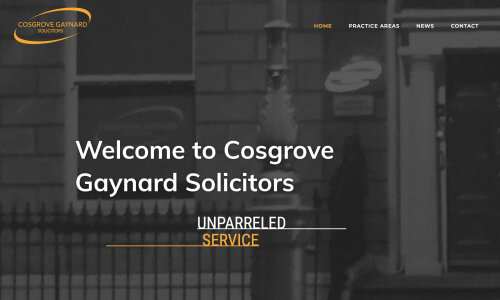Best Business Registration Lawyers in Dublin
Share your needs with us, get contacted by law firms.
Free. Takes 2 min.
List of the best lawyers in Dublin, Ireland
About Business Registration Law in Dublin, Ireland
Business registration in Dublin, Ireland, involves the formal process of legally recognizing a business entity that conducts activities within the country. The process is overseen by the Companies Registration Office (CRO), which ensures compliance with the Companies Act 2014. This legislation outlines the requirements for forming, running, and dissolving businesses. Registering a business properly is fundamental for legal protection, tax purposes, and operating within legal frameworks.
Why You May Need a Lawyer
There are several situations in which you may require legal assistance when registering a business in Dublin:
- Understanding complex legal requirements and compliance under the Companies Act 2014.
- Choosing the right business structure, such as a sole trader, partnership, or limited company.
- Assessing the legal implications of business activities, including taxes, liabilities, and intellectual property rights.
- Ensuring accurate and complete documentation for registration.
- Handling disputes or legal challenges that arise during or after the registration.
- Combining local and EU regulations if you plan to do business across borders.
Local Laws Overview
Business registration laws in Dublin are primarily driven by the Companies Act 2014 and the specific guidelines provided by the Companies Registration Office (CRO). Key aspects include:
- Types of Business Entities: Different structures include sole trader, partnership, Private Company Limited by Shares (LTD), Designated Activity Company (DAC), and more.
- Registration Requirements: Requirements vary by business type but usually include submitting forms, fees, and supporting documentation to the CRO.
- Company Names: The name must not be too similar to existing companies, should not be misleading, and must comply with naming conventions.
- Directors and Secretaries: Specific rules govern the number and residency of directors and the necessity of a company secretary.
- Tax Registration: Businesses must register for taxes, including VAT, PAYE, and Corporation Tax, with Revenue, Ireland's tax authority.
- Compliance and Reporting: Businesses are required to file annual returns, financial statements, and adhere to corporate governance standards.
Frequently Asked Questions
1. What is the role of the Companies Registration Office (CRO)?
The CRO is responsible for registering companies, ensuring compliance with legal requirements, and maintaining a database of registered businesses in Ireland.
2. What is the cost of registering a business in Dublin?
The cost varies depending on the type of business entity and specific filing requirements. Basic registration for a private limited company typically starts from around €50-€100.
3. How long does it take to register a company?
Registration times can vary but generally take around 5-10 working days if all documentation is correctly submitted.
4. Can a foreign individual register a business in Dublin?
Yes, foreign nationals can register a business in Dublin. However, they must comply with Irish regulations and may need to appoint a resident director or use a branch registration.
5. Do I need a business bank account?
Yes, it is advisable to have a separate business bank account for managing finances, ensuring transparency, and simplifying tax calculations.
6. Do I need a physical address in Dublin to register my business?
Yes, you typically need a registered office address in Dublin, which will be used for official correspondence. Some virtual office services can provide this.
7. What are the annual compliance requirements?
Businesses must file annual returns, financial statements, and ensure compliance with corporate governance standards by submitting these to the CRO.
8. Is it mandatory to register for VAT?
Businesses that exceed the threshold for taxable turnover (currently €75,000 for goods and €37,500 for services) must register for VAT.
9. Can I change my business structure later?
Yes, it is possible to change the business structure later, but it may require legal advice, notification to the CRO, and compliance with conversion procedures.
10. Do I need a company secretary?
Private limited companies must appoint at least one company secretary who can be a separate individual or one of the directors, ensuring compliance with statutory and legal requirements.
Additional Resources
Here are some resources that can provide further assistance and information on Business Registration in Dublin:
- The Companies Registration Office (CRO): The main body responsible for business registrations.
- Revenue: For tax registration and compliance information.
- Local Enterprise Offices (LEOs): Provide support and resources for small businesses and startups.
- Irish Law Society: Offers comprehensive legal advice and resources.
- Enterprise Ireland: Supports high-potential startups and businesses with global ambitions.
Next Steps
If you need legal assistance with business registration in Dublin, Ireland, consider the following steps:
- Research and identify a lawyer or law firm that specializes in business law and has experience with business registration.
- Prepare and gather all relevant business information and documentation.
- Schedule a consultation to discuss your specific needs and gain a clear understanding of the registration process.
- Follow the lawyer’s advice on documentation, legal requirements, and compliance to ensure successful registration.
- Stay informed about annual filing and compliance requirements to maintain your registered status.
Lawzana helps you find the best lawyers and law firms in Dublin through a curated and pre-screened list of qualified legal professionals. Our platform offers rankings and detailed profiles of attorneys and law firms, allowing you to compare based on practice areas, including Business Registration, experience, and client feedback.
Each profile includes a description of the firm's areas of practice, client reviews, team members and partners, year of establishment, spoken languages, office locations, contact information, social media presence, and any published articles or resources. Most firms on our platform speak English and are experienced in both local and international legal matters.
Get a quote from top-rated law firms in Dublin, Ireland — quickly, securely, and without unnecessary hassle.
Disclaimer:
The information provided on this page is for general informational purposes only and does not constitute legal advice. While we strive to ensure the accuracy and relevance of the content, legal information may change over time, and interpretations of the law can vary. You should always consult with a qualified legal professional for advice specific to your situation.
We disclaim all liability for actions taken or not taken based on the content of this page. If you believe any information is incorrect or outdated, please contact us, and we will review and update it where appropriate.















